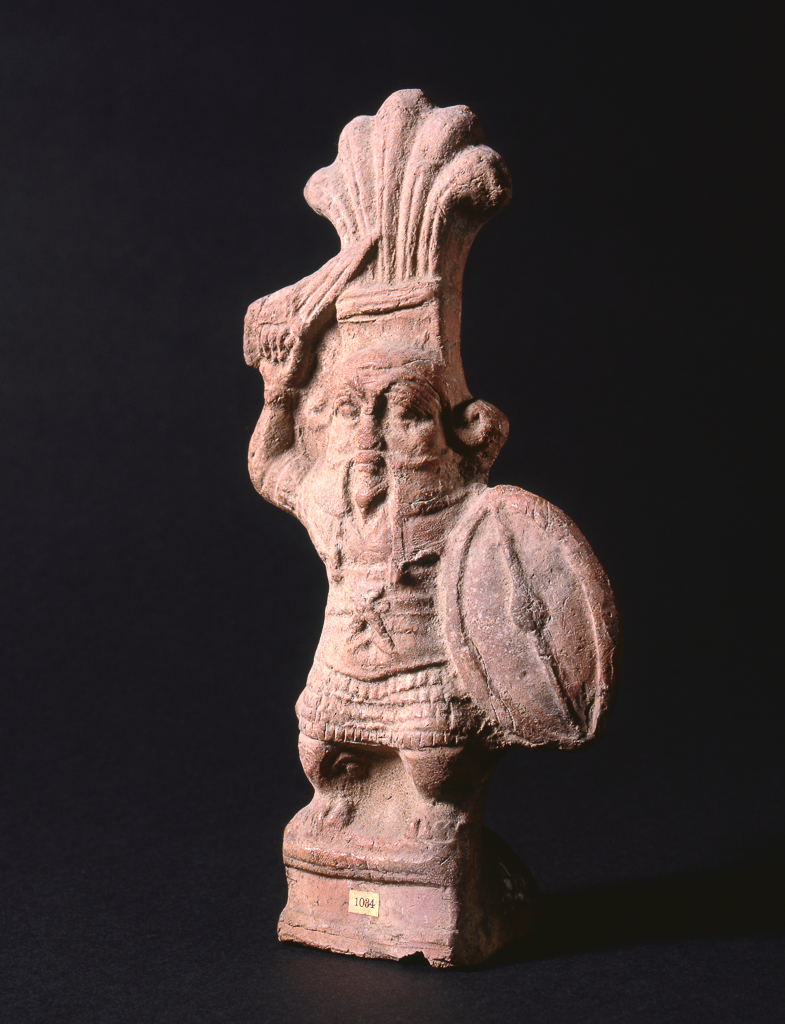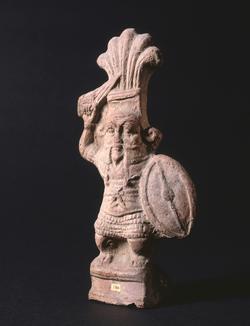Current Location: Gallery 19
Titles
Clay figure of Bes as a soldier
Entities
Categories
Description
Nile silt clay, mould-made in three parts: the front, which was pushed into a mould and sealed with a flat clay back, the shield and the base, which is also sealed at the top. The back of the piece is not modelled but there are the remains of four points of clay which indicate that the figure was fired on its back and was propped during this process on account of the depth of the base. There are traces of a plaster wash on the surface.
Bes is always shown as a dwarf-like figure with leonine ears and ruff. His face is exaggerated, with mask-like features and he usually extends his tongue. Traditionally, he was a household deity who protected sleepers, women in childbirth and women from each other's jealousy. In the Roman period, however, he became associated with new and more specific social groups in society.
Here we see Bes as a Roman soldier. He wears a tunic and skirt that is moulded in a fashion to suggest that it is made from a series of tongues. In his left hand he holds an oval shield. His right arm is raised and holds a small sword or dagger towards his crown. The headdress is made up of five plumes in the traditional form for Bes. His tongue is not obviously projecting, but the surface in this area is rather worn.
Bes appears with a sword in the Ptolemaic period but he usually stands with only a panther skin and is not dressed in military attire. He became enormously popular with Roman troops in Egypt, who may have mistaken the sword that Bes used to fight off household spirits as a piece of military equipment. Although no temples were dedicated specifically to him, he remained popular as a household deity and his statue was often included in temples to other gods. Only the sword indicates his warrior status in the Ptolemaic period; Roman examples show him in full military dress.
Measurements and weight
Height: 21 cm
Acquisition and important dates
Method of acquisition: Bequeathed
(1932)
by
Whyte, Edward Towry
Dating
1st Century BC, Late
1st Millennium, Early
Circa
-0030
BCE
-
Circa
395
CE
School or Style
Romano-Egyptian
Materials used in production
Clay
Techniques used in production
Mouldmade
References and bibliographic entries
Identification numbers
Accession number: E.207.1932
Primary reference Number: 52934
Oldadmincategory: P
Stable URI
Audit data
Created: Saturday 6 August 2011
Updated: Wednesday 15 October 2025
Last processed: Wednesday 15 October 2025
Associated departments & institutions
Owner or interested party:
The Fitzwilliam Museum
Associated department:
Antiquities

 IIIF Manifest
IIIF Manifest




